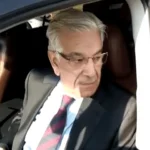General Qamar Bajwa, the chief of the army staff, said on Wednesday that the military has decided to remain apolitical and would do so moving forward.
The army chief said that he was addressing the Defence and Martyrs Day event at General Headquarters in Rawalpindi “as the army chief for the final time…I am retiring soon.”
After paying tribute to the fallen, General Bajwa commented on political matters, saying that armies throughout the world are seldom criticised, while Pakistan’s army is often criticised. “I believe the army’s involvement in politics is the cause of that,”
“The army decided not to interfere in politics because of this in February of this year.”
The outgoing army chief expressed regret over the use of inappropriate language by certain quarters, saying that while political parties and the general public have the right to criticise the army, “the language used should be [better].”
“The army has begun its catharsis, and I hope political parties will reflect on their behaviour as well,” Gen Bajwa remarked.
The army chief, who is set to retire on November 29, stated that “every institution, including political parties, has made mistakes.” He went on to say that the nation should learn from its failures to move ahead.
The army chief remarked, in a thinly veiled reference to the PTI’s allegations of regime change, that a “false narrative was created from which an escape is now being attempted.”
The army wouldn’t have sat by and done nothing, he said, if a regime change operation had taken place. Instead, it would have protected the country.
The COAS said that no one political party could save the country from its current fiscal crisis and that the country was dealing with major economic difficulties. Political stability was thus necessary.
Gen Bajwa urged the development of a “true democratic culture,” saying that when a party won the 2018 elections, it was labelled as “chosen,” and when a party was removed from the Centre following a vote of no confidence, it was labelled as an “imported” government.
The army commander stated, “We need to reject this behaviour; success and failure are a part of politics,” adding that Pakistan’s political parties would have to “develop the strength” to accept successes and failures.”
The army chief also mentioned the loss of then-East Pakistan in the 1971 Pak-India war at the beginning of the event. He said that despite being vastly outnumbered and exhausted, the armed forces had fought bravely, making it a political failure.












